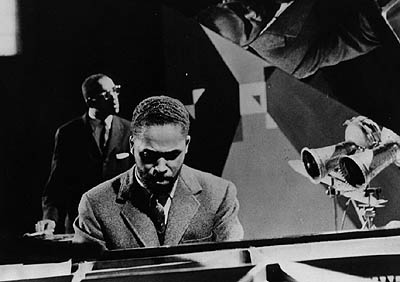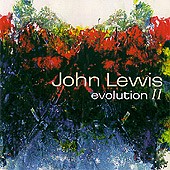

Courtesy of John Lewis

Atlantic Records
A FIRESIDE
CHAT WITH JOHN LEWIS
I
dated a judge once who was an avid jazz fan. She adored the Modern Jazz
Quartet and would play Django and Dedicated to Connie in the mornings
with her coffee (black, no sugar). She was about as ball-breaking as they
come, but I will always remember her for introducing me to Milt Jackson,
Connie Kay, Percy Heath, and John Lewis. With the passing of Connie Kay
and more recently, Milt Jackson, I thought it would be a good time to
welcome Mr. John Lewis to the Roadshow. As the musical director of the
MJQ for its entirety, Lewis holds a special place in my heart. But it
is his participation in bringing Ornette Coleman to Atlantic that makes
him a Roadshow legend. I am honored to present to you, John Lewis, unedited
and in his own words.
FRED JUNG: Let's start from the beginning.
JOHN LEWIS: Well, jazz was the most interesting music around when I was
young. I started playing with members of my extended family, my cousins,
when I was about eight or nine years old. We made our own entertainment.
This was in 1929, '28, a long time ago. The music, at that time, was still
in a state of development. A lot of the things that they played weren't
very attractive to me. Louis Armstrong was the first, kind of, great attraction,
I guess, introducing an element into the music that stapled, holds the
music together, the sense of swing. Then later, in the beginning of the
Thirties, '31, '32, it became enormously progressed by Ellington's music.
At the same time, Fred, I have to say that I listened to other music too.
La Grange, at that time, was a very musical city. There was music instruction
and concerts and they had music instruction in all the schools. The piano
was my first instrument. I started that when I was about four or five
years old, five years old, I think. I had private lessons, first with
my cousin, who was a music teacher, piano teacher and later with other
teachers. It continued that way and for me, it was wonderful because I
just enjoyed observing its development and going through, in many cases,
parallel stages of the development in other Western European music.
FJ: The idea of swing, is swing a concept that can be defined?
JOHN LEWIS: Impossible. Yeah, it is just as impossible as trying to interpret
Beethoven.
FJ: Does Beethoven swing?
JOHN LEWIS: Depends on the performance.
FJ: Let's touch on your time with Dizzy Gillespie.
JOHN LEWIS: Well, he gave to me one thing. He was a very wonderful, kind
human being, first. Second, he was enormously important because he was,
he and Charlie Parker stood for, finally, the music then was being defined
by both virtuoso playing, improvisation and virtuoso performance of the
material the improvisation was based upon.
FJ: You collaborated with Bird as well.
JOHN LEWIS: Yes, it was a great pleasure of hearing all that perfect music
every time I played with him, every time I listen to him, still. He was
a genius.
FJ: To your best recollection, was there ever a time when Bird wasn't
on?
JOHN LEWIS: No. Nope.
FJ: And your long association with Milt Jackson, you were initially a
member of his quartet.
JOHN LEWIS: Yeah, that was put together by Dizzy. Dizzy started a record
label and he wanted Ray Brown, he wanted the whole rhythm section to record,
to make one of the first records for the label called DG, which he had
in partnership with a young man from Detroit.
FJ: And that quartet went on to become what we know as the Modern Jazz
Quartet.
JOHN LEWIS: That's right. I was the artistic director. I wanted us first,
to be able to make a living (laughing). And at the same time, play the
music that we all belonged to, Milt and I and Percy Heath and first, Kenny
Clarke and later Connie Kay. So I created music for those people that
I was playing with and we had to find a way of programming and playing
music that would be interesting long enough for people to listen to it.
Playing concerts is a very different animal than playing part of a concert
or playing for dancing. It was a big step, but it all developed, to me,
in a very natural way and with no surprises.
FJ: Writing music for the musicians in the band is something that Duke
Ellington is celebrated for.
JOHN LEWIS: Well, it has to do with making music for people so that it
will be comfortable for them to play. It is like making a suit, tailor
making a suit for someone, for their shape, in this case, for their abilities
and so forth, what they can do. I had the very fortunate opportunity to
have first, a fantastic, wonderful soloist in Milt Jackson, who I could
ask almost to do anything. He would play something for me. With Percy,
Percy didn't start playing until we had been playing for a long time,
but he started playing bass, I think, first in 1946 or '47. It helped
develop his whole musicality.
FJ: Having said that, has there been any recording of one of your compositions
that you found more impressive than the original Modern Jazz Quartet interpretations
of your work?
JOHN LEWIS: No.
FJ: What brought on the parting of ways for the members of the Modern
Jazz Quartet?
JOHN LEWIS: The changing ways that the profession was becoming in this
sense. When we started, usually, when we worked was always in the fall,
autumn, and spring. We didn't work Christmas time and New Year's at all.
We wanted to be home with our families then and Milt had a birthday, which
is the first of January. Then it came for us to start working in the summer
at festivals and so forth and pretty soon, we didn't see the families
at all, which is a really terrible thing, I think. So when we agreed to
stop, I agreed, I am kind of a workaholic, but I was very quick intuitionally
to realize that maybe we should, maybe it was time to let this go for
a while so we can relate to our children and our wives, especially to
our children. That was the principal reason, to try to be more at home
with our families. We had everything else we needed. Fortunately, when
we stopped our children were small, very small, my children were, no,
all of our children were. But it must have been a hardship. Family is
a natural thing and therefore, you have to have a very understanding wife
to do that with. It doesn't work with everyone and everyone doesn't have
an understanding of what that profession is about.
FJ: You have had a longstanding relationship with Atlantic Records, at
one period, even taking up producing duties.
JOHN LEWIS: A little bit, not a lot, I didn't have time for that. I produced
MJQ's records and I didn't care about the production thing anytime. I
was allowed free hand to do whatever I wanted to by Nesuhi Ertegun.
FJ: You were the producer behind Ornette Coleman's decisive recordings
on Atlantic.
JOHN LEWIS: Yes, they allowed me to do that. I met him in California.
We were playing at the Blackhawk and he came up from Los Angeles. He wanted
to ask Percy if they could record with him. We met him and we invited
him. On Sunday afternoons, they used to have a jam session where we played.
We were the house artists, but we would invite other people and it was
an opportunity to hear him. Percy wanted to hear him and so he came on
Sunday and he played and I was fascinated by the way he played and still
am. At that time, I thought that the ideas that he had at that time were
quite wonderful. So I told Atlantic and they agreed. We had a little school
for three weeks in the summertime in Massachusetts. We had a place called
the Music Inn. It was an inn, where people came and stayed, usually for
the Tanglewood concerts. At the end of the Tanglewood season, our little
school started. It still is a miracle to me of the people that were the
proprietors. I haven't seen anything happen like that, before or since.
So Ornette came up to the school and it was good exposure for him and
the school got a lot of attention because there were the best jazz musicians
in the world that came up that were friends of mine to give their time
to the school.
FJ: Reflecting back on that period, did you have any inclination that
Ornette's playing and approach would be as revolutionary as it has proven
itself to be?
JOHN LEWIS: Yes, it was revolutionary because nobody had come up with
the way he makes music in music, in the art of music. It had been done
before in, this is my, what appealed to me, it just reminded me and made
me think of James Joyce and it made me think of Dylan Thomas, who were
favorite authors and poets of mine.
FJ: Should Ornette be considered one of the seminal figures of this music?
JOHN LEWIS: No, I can't say that completely. I think his addition to the
mainstream is a contribution. He is not as important as Louis Armstrong.
He is not as important as Ellington and not as important as the collective
personality that we call Count Basie and I think I have to include Fletcher
Henderson, who was widely influential. But his contribution that he (Ornette)
has made can be used, but I don't think it has been yet. I am hoping for
that.
FJ: So after forty years, Ornette's conception has yet to be fully realized?
JOHN LEWIS: Yes. Maybe they can't do it. I think it is possible, but it
is not going to be possible without comparison.
FJ: How do you approach playing the piano now and does it differ from
your approach on your earlier recordings?
JOHN LEWIS: No, it is the same. I am the same. I listen to some very old,
much older things and I see that I am the same. Except, what I decided
to do with the Modern Jazz Quartet is I kind of gave up my role as a soloist.
I didn't care about that. The whole was more important than the parts
with that group. So I decided that I would do the best I could to become
the best accompanist in music. And as far as I'm concerned, I did.
FJ: Why were you not more self-serving?
JOHN LEWIS: I wasn't interested in that because I had one of the greatest
gems in the world playing vibraharp. He was the greatest vibraharper we've
had. Nobody's better, at least not that I have heard, at all. Now, since
Milt has passed away and Connie has passed away, I've fallen in love with
the piano again. I love playing, but it is very, very hard work. You have
to work at it and you have to work at it everyday, Fred. So I keep working
at it everyday and someday soon, I hope, I will be satisfied with it.
FJ: So even now, it is a learning process for you?
JOHN LEWIS: Yes, and which I enjoy. I love the challenge.
FJ: And the future?
JOHN LEWIS: There is going to be another Evolution III. This one will
be, I will be the primary soloist, improvising soloist that is on the
material, but it will be with various instrumental combinations.
Fred Jung is the Editor-In-Chief and is behind closed doors. Email
Him.